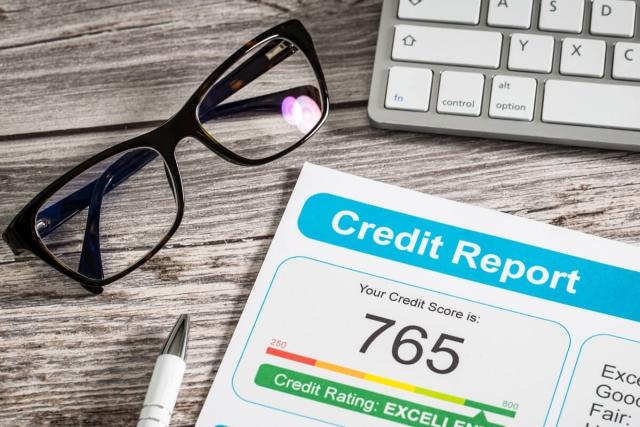Credit is one of the most important factors in your financial life and impacts your ability to open a credit card, secure a loan, and, depending on the landlord, rent the perfect apartment. Although it’s possible to rent an apartment with a low credit score, working towards a higher score will help you in the long run.
Highlights
- You have multiple credit scores
- Credit scores are measured on a scale from 300 to 850 and are used by landlords to assess your reliability as a tenant
- Paying bills on time and in full is a good place to start when working to improve your credit score
- Keeping your credit utilization under 30% of your available credit can increase your credit score and make you eligible for better loan terms
- Monitoring your credit with annual credit reports or a credit monitoring service can allow you to address bad financial habits or dispute inaccuracies with the credit bureaus
What Is a Credit Score?
A credit score is measured on a scale from 300 to 850, with 850 being the best possible score. Banks, credit card companies, and other entities you conduct business with use credit scores to determine the likelihood that a person will pay back a loan or pay bills on time. The higher your score, the more likely you are to qualify for loans, credit cards, and lower interest rates.
Your credit score also impacts your ability to rent an apartment. When property managers or landlords screen tenants, they reference an applicant’s credit score to help them determine if someone will be a reliable tenant.
Apartment communities typically require a minimum score of 600. Paying a larger security deposit, getting a cosigner, and providing references can help you secure an apartment if you have a low credit score or zero credit.
Types of credit scores
Three federal credit bureaus calculate and report credit scores: Equifax, Experian, and TransUnion. While all three consider similar factors when calculating a score, their algorithms differ. This means that your credit score will differ slightly between the three.
In addition to your Equifax, Experian, and TransUnion scores, you also have FICO scores. FICO is an acronym for the Fair Isaac Corporation, an analytics software company that developed credit-scoring models that most creditors reference when considering you for a new line of credit. Like your credit bureau scores, FICO scores are measured from 300 to 850, with 850 being the best.
There are multiple types of FICO scores, including FICO Scores 2, 4, 5, and 8, as well as FICO Auto Scores and FICO Bankcard Scores. The specific model used varies by lender, but most use FICO Score 8.
Similar to FICO, VantageScore is another credit-scoring model. According to Forbes, FICO scores are the industry standard, but several banks reference VantageScores. According to Business Insider, credit monitoring services often show your VantageScore.
How are credit scores calculated?
While the federal credit bureaus, FICO, and VantageScore all have their own specific algorithms, here are some of the factors they all consider when calculating your credit score:
- Payment history on loans, credit cards, and other bills
- Credit utilization ratio, or how much debt you owe compared to your amount of available credit
- Credit mix, or the types of credit accounts you have
- Credit age, or how long you have had accounts open
- How often you apply for new lines of credit
- Negative marks like collections or bankruptcy
Since calculating credit scores is complex, it’s good to understand which financial habits will positively or negatively impact your credit.
Checking your credit score
You can check your credit score with a free credit score service or by checking your credit report from one of the three credit bureaus. Some banks and credit card companies also provide customers with FICO scores or VantageScores on statements or an online portal.
When you view your credit score, you’ll see which factors impact your score the most. Identifying the habits that negatively affect your credit score will help you determine what changes need to be made and develop an action plan.
How to Improve Your Credit Score
Improving credit takes time. It can take months or years to get your desired score, but there are small steps you can take that will help you in the long run. Here are some tips to help you earn a higher score so you can rent the apartment of your dreams.
1. Get a credit card

If you don’t have a credit card, now is the time to apply for one! Managing a credit card properly is a great way to build up your credit. However, credit cards can be hard to acquire if you have little to no credit history or bad credit history. Luckily, there are alternatives to a standard credit card.
If you’ve struggled to be approved for a standard credit card, consider a secured credit card. Much like an apartment, a secured credit card requires a security deposit that acts as insurance in case you miss monthly payments. The deposit for a secured card is typically the same as the credit limit, and lenders will use the deposit to cover any unpaid debts. Like a security deposit for an apartment, you’ll get your deposit back when you close the secured credit card or when your credit card company upgrades you to a standard, unsecured card.
Another option is to become an authorized user on a friend or family member’s credit card account. Having someone with great credit add you as an authorized user can help your own credit by boosting your credit age and payment history. While the primary cardholder is liable for making payments on the account, paying back the primary cardholder for your portion is a great way to build healthy financial habits in a lower-stakes environment.
When becoming an authorized user on someone else’s account, it’s important to understand that you and the primary cardholder can help or hurt each other’s credit score. If the primary cardholder misses payments on their credit card account or if you charge too much to your authorized card, both of your credit scores will go down.
Regardless of the type of card you decide is right for you, try to find one that reports to all three credit bureaus so you can ensure your scores improve. Pay attention to the interest rates and fine print to avoid unexpected fees.
2. Pay bills on time
Payment history is one of the biggest factors in calculating credit scores and is seen as one of the best predictors of financial behavior. Paying a bill late or settling a loan account for a lower amount than you initially agreed will hurt your credit. Late or missed payments and debt collections will show up on your credit report for seven years.
Set up automatic payments to make sure you don’t miss a bill and pay off your credit card and any loans in full every month to avoid interest rates and a hit to your credit score.
3. Pay off debt
If you don’t have the best payment history, don’t fret! Older late payments will have less of an effect on your score than more recent bills. If you’re behind on payments, make it a priority to pay off those accounts. The sooner your debt is paid, the sooner your score can increase.
If you have delinquent accounts or collection accounts, work towards paying the past due amount before you apply for new credit. These negative marks will not be erased from your credit report, but paying off your debt and paying on time in the future will help you in the long run.
In some unforeseen circumstances, such as a medical emergency or job loss, you can write a goodwill letter to a creditor asking for a late payment or a negative mark to be removed from your credit reports.
4. Calculate a good credit utilization rate

Credit utilization is the ratio of overall used credit to the amount of available credit and is another large factor in calculating your credit score. A low credit utilization ratio indicates that you can successfully manage your credit and won’t max out your credit cards. The Consumer Finance Protection Bureau recommends keeping your utilization rate under 30% of your total line of credit.
To calculate your current credit utilization rate, divide your total debt by your total available credit. Here’s an example using a single credit card:
You have a credit card with a $10,000 credit limit and a $4,500 balance.
$4,500/$10,000=0.45 or 45%
With this credit card, your credit utilization ratio is too high. You would need to pay more than the balance to be on track or have other, more infrequently used credit cards to lower your overall credit utilization rate.
Now, let’s calculate what the maximum balance on your credit card should be for a healthy credit utilization ratio:
$10,000 x 0.3=$3,000
To reach a healthy credit utilization rate, you’d have to reduce spending with this credit card from $4,5000 to $3,000.
Check your credit card limit and calculate your budget using the suggested credit utilization ratio of 30%.
5. Keep credit balances low
This tip might seem like a no-brainer, but buying expensive items with a credit card is a mistake many people make. This is an issue for two reasons:
- If you make a purchase with your credit card that you won’t be able to pay back at the end of the month, the interest will pile up quickly, placing you further in debt
- Making major purchases with your credit card can quickly put you over a good credit utilization ratio
As you pay off your credit card, your credit utilization will decrease. A high outstanding balance can negatively impact your score, so you want to keep all your credit balances low. If an emergency arises and you must use your card for a major purchase, split the credit card bill and make two payments that month to keep your credit utilization rate low.
6. Ask for a credit increase
Raising your credit limit on a credit card will lower your utilization rate as long as your balance doesn’t increase disproportionately. A credit increase can also improve your credit score by giving you more purchasing power without harming your credit utilization rate.
A higher credit limit can also help you get a loan in the future. If you’re approved for a credit increase, it will show up on a credit report. When lenders check your credit after you apply for a loan, they’ll see that your credit card company entrusted you with a higher credit limit, which will help them see you as a reliable loanee eligible for lower interest rates.
If you have missed payments, asking for a credit increase isn’t recommended. Unnecessary credit could also tempt you to overspend again and fall into more debt.
7. Find out the credit reporting date

If your credit card bill payment is received after your credit card company reports to the credit bureaus, your balance could appear high, increasing your utilization ratio and harming your credit score. Ask your credit card company when they report to the bureaus and pay your bills before the closing date. This will ensure that your credit utilization rate remains low, ultimately boosting your score.
8. Keep old accounts open
Even if you don’t use a credit card or account anymore, keep it open. Credit history length is an important factor when calculating scores, so keeping an old card can add to your credit age and increase your credit score.
Closing a credit card will increase your credit utilization ratio. Without the old card’s available credit, your overall credit limit will decrease, which will decrease your utilization rate even if your spending doesn’t change.
As long as you’re not paying too much in annual fees, keeping an old credit card open is a great strategy to build your credit score. Use the card every now and then so the credit card company doesn’t close the account, and don’t forget to pay the balance each month.
9. Work toward a good mix of credit
Credit mix is another common factor used to calculate a credit score. Managing different kinds of credit accounts shows you can manage different types of debt at the same time. If you properly manage multiple different lines of credit, your credit score will increase because it shows that you are a reliable loanee.
How can you diversify your credit portfolio? The goal is to strike a balance between revolving credit and installment credit.
Installment credit includes a loan where you agree to borrow a set amount and pay off the loan in monthly installments. Mortgages, student loans, personal loans, and auto loans are all types of installment credit.
Unlike installment credit, revolving credit does not have a set end date or balance. Revolving credit allows you to repeatedly borrow money up to a maximum credit limit and pay it off over time. Credit cards are the most common type of revolving credit.
10. Apply for new lines of credit only as needed
If you don’t have a diverse credit portfolio, don’t go out and apply for more credit just for the sake of improving your credit mix. Experian says your credit mix is unlikely to make or break your likelihood of approval for a credit account, so only apply for credit as necessary.
Too many credit applications in a short time or a quick buildup of credit accounts can look risky, especially for new credit users, and a hard inquiry is required when applying for a new line of credit.
A hard inquiry, also called a “hard pull,” is a credit check that a lender performs to assess your eligibility for a loan. Hard inquiries only drop your credit score a few points and the impact fades over time, but too many hard inquiries can hurt your score significantly.
Hard inquiries can stay on your credit report for two years, so it’s important that you know your credit score before applying for a new credit account. Property managers and landlords may perform hard or soft inquiries depending on their leasing process, so you should know your credit score before applying to an apartment.
In contrast, a soft inquiry does not impact your credit score even though it is reflected on your credit report. A soft inquiry, also called a “soft pull,” is when you request your credit reports from the credit bureaus for your own reference.
11. Check credit reports and dispute errors
While credit reports and credit scores may sound like the same thing, they are different. Your credit score is a number that summarizes your credit activity and reliability as a loanee. Your credit report is a comprehensive history of your payment activity and active accounts. Essentially, a credit report is an explanation of your credit score.
A credit report shows how and when you pay your bills, the amount of debt you owe, and how long you have managed credit accounts. Since credit reports are used to compute scores, it’s important to review them for inaccuracies that will drag down your credit score.
Get a copy of your credit report from all three credit bureaus to know where you stand across the board. By federal law, you are entitled to free credit reports from each bureau every year, which are available in alternative formats for accessibility.
Requesting a credit report will not hurt your credit score because it is a soft credit inquiry, so take advantage of the free annual reports. Verify that the information from each account is correct, and contact the credit bureaus directly to dispute any errors.
12. Use a credit monitoring service
Online credit monitoring services will alert you to changes in your credit report and provide a monthly credit score from at least one federal credit agency. Some banks provide all customers with credit monitoring, but separate services are available for free or a small fee.
In addition to helping you keep an eye on your credit score, credit monitoring can also help prevent fraud and identity theft. If you receive a notification about an unfamiliar new credit account on your credit report, you can immediately report the fraud to the Federal Trade Commission.
13. Seek financial advice

If you’re struggling with improving your credit score due to credit card debt, help is available.
Start by talking with a financial advisor or credit counselor. There are multiple credible credit counseling services, many of which are free or charge a small fee. A credit counselor can help you develop a Debt Management Plan (DMP) and negotiate with creditors to waive late fees or lower interest rates. You can learn more about finding a credible credit counselor from the National Foundation for Credit Counseling.
Seeking assistance from a financial advisor or a credit counselor will not harm your credit score—in fact, taking their advice can help get your financial habits back on track and increase your credit score over time.
You can also participate in a credit card hardship program through your credit card company. The specifics vary depending on your credit card company, but many hardship plans will lower interest rates or waive late fees to make it easier to pay back what you owe. Participating in a hardship plan could cause your credit score to drop temporarily, but completing your hardship program can help your score in the long run.
14. Know your rights
It’s important to know your rights while improving your score, and there are a few major laws that protect you as a consumer.
The Consumer Credit Protection Act (CCPA) requires financial institutions to disclose loan terms in layman’s terms and fairly report a person’s financial information.
The Equal Credit Opportunity Act (ECOA) prohibits creditors and lenders from discriminating against applicants based on age, sex, race, color, religion, marital status, income from public assistance, or a history of exercising rights under the CCPA.
The Fair Credit Reporting Act (FRCA) gives you the right to know if anything in your credit report is being considered against you. This allows you to dispute inaccuracies before being declined for a loan application or a rental.
When will my credit score improve?
Since credit is complex and various risk factors impact credit reports and scores, you can’t accurately estimate when your score will increase. The time it takes to build your credit depends on what caused your score to drop. Hard inquiries will stay on your credit report for two years, while other items like delinquency will be listed for up to 10 years.
There’s no shortcut to improving credit, but identifying the financial habits that are dragging down your score and developing a plan to build a good credit history will help you in the long run.
This article was originally published on November 11, 2020, by Jamia Kenan.
FAQs
What’s the difference between a credit report and a credit score?
A credit report is a detailed account of your credit history from one of the three credit bureaus: Experian, Equifax, or TransUnion. It shows your payment history on credit cards and loans, derogatory marks like delinquent accounts or collection items, and hard inquiries over the past two years.
Your credit score is a number between 300 and 850 that summarizes your reliability as a loanee based on the information in your credit report. Lenders and some landlords will check your credit score as a quick way to assess the likelihood of you paying back what you owe.
How long does information stay on my credit report?
Most significant negative marks like late payments, collections, and foreclosures stay on your credit reports for seven years, but some bankruptcies stay on your reports for 10 years.
Both hard and soft credit inquiries stay on your credit report for two years, but only hard inquiries can harm your credit score.
Any open accounts will show up on your credit reports as long as they’re active, and accounts that you closed in good standing will stay on your reports for up to 10 years.
What’s the difference between a FICO score, a VantageScore, and a credit bureau score?
FICO is a specific credit-scoring model. Experian, Equifax, and TransUnion each have their own algorithms to calculate your credit score, but the one lenders are most likely to look at is your FICO score.
The VantageScore model requires less credit history to calculate a score. If you’re new to credit, it’s possible that you may have a VantageScore but not a FICO score. According to Business Insider, credit monitoring services like Credit Karma or Experian Boost often show your VantageScore.
How many credit cards is too many?
While opening a second credit card can benefit your credit utilization and payment history, more than two major credit cards is unnecessary and can be hard to keep track of.
Keep in mind that although a new credit card can increase your credit mix and lower your utilization rate, the application will also result in a hard inquiry on your credit report. Your credit score will drop a few points, but it will increase over time if you responsibly manage your new card.






